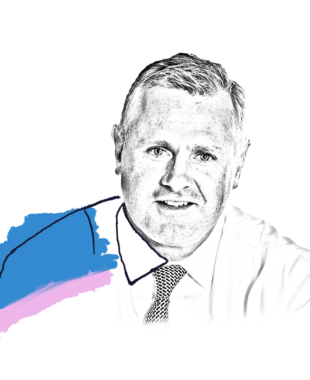Just over a year ago, Russia embarked on its ‘special military operation’ seeking the demilitarisation and ‘denazification’ of Ukraine based on President Putin’s view that the country is a puppet of Western designs on the Motherland’s sovereignty, and under the guise of protecting ethnic Russians in the Donbas region. The invasion acted as an accelerant for various economic trends that had already been in train as the world emerged in piecemeal fashion from the global pandemic. Commodity prices, including those of oil and gas, had been on the rise since late 2020 reflecting the nascent global economic recovery as well as supply chain blockages. Inflation had started to trend higher, and markets had begun to digest the tilt towards tighter monetary policy when the outbreak of hostilities brought about a sharp spike in energy and a range of commodity prices, adding fuel to inflationary fires.
Europe’s now-redundant belief in post-communist Russia’s ‘buy-in’ to Western commercial ideals was never more evident than in an energy policy which left the continent so reliant on Russian gas imports. With Putin weaponising supplies, Europe was front and centre of fears over a recessionary spiral, with rising energy bills dampening consumption and central banks in tightening mode. Governments were forced to embark on a fiscally profligate support programme of subsidies and price caps, which have now amounted to €770bn1.
There is growing confidence that any economic slowdown in Europe is not likely to be severe
One year on, Europe has adapted to the new circumstances with atypical alacrity. In 2021, approximately 45% of EU gas usage was imported from Russia. As of November last year, this figure had dropped to 13%2, although some of the more minor economies of Europe are still dependent on Russian gas. Aside from Russia’s own interference with supply, Europe has managed to wean itself off Russian supply to a large degree helped by ample storage, efforts to source alternative supplies, and a mild winter. Imports of LNG from the US and Qatar have increased, and investment in new LNG ports across Europe is ongoing. Benchmark gas prices have fallen sharply, dropping over 85% from the August peak to the current level of just under €50 per megawatt hour (MWh), although they are still above the historical range of €10-30 MWh. There is growing confidence that any energy related economic slowdown in Europe is not likely to be severe, amidst hopes that adequate supply can be maintained over the next winter period.
Inflation remains an issue nonetheless, although it does appear to be peaking. Higher energy bills in Europe are still squeezing consumer wallets to varying degrees, although price caps and subsidies have prevented the affordability Armageddon that was predicted at the start of the war. Eventually, the decline in wholesale prices will be transmitted to the consumer. However, food inflation continues to rise globally, and this is partly a function of the role of energy in food and fertiliser production and in the transportation of agricultural products. This should abate in time given the downswing in oil and gas prices, while commodities such as wheat and corn, of which Ukraine is a significant supplier, have seen prices pull back from 2022 highs.
Consumers and companies are having to contend with a still-sticky inflationary environment
In the meantime, however, consumers and companies worldwide are having to contend with a still-sticky inflationary environment, with real incomes under pressure and businesses having to navigate the challenges posed by demand contraction and rising costs. In tandem with the corrective medicine of higher interest rates, the global economic outlook remains uncertain in 2023, although the latest IMF report3 is still forecasting growth for major economies with the exception of Brexit-battered Britain. Helping matters is the possible economic resurgence of China, now liberated from lockdowns, which would be beneficial for global growth and companies across the world. However, events in Ukraine have also further complicated the West’s tetchy relationship with China, with the latter seen to be offering quasi-support to the Putin regime.
For the vast majority of the world’s leading companies with whom we have engaged, their exposure to Russia and Ukraine has been negligible, with any exposure in terms of sales to these countries of low single-digit magnitude. There were nonetheless a few companies which were faced with the question of what to do with their Russian assets, from an economic, geopolitical and ethical standpoint. The common denominator is that they have continued to thrive irrespective of those challenges.
With its differentiated, omni-channel business model, Inditex continues to offer products that attract fashion-conscious consumers throughout the world
Although Russia accounted for 8.5% of earnings before interest and tax (EBIT) prior to the Ukraine invasion, Inditex had no choice but to temporarily close the stores in both countries at the beginning of March 2022. In June, management decided to provision €216m for expenses expected to be incurred in Russia and Ukraine over the remainder of the year. The fiscal year ending January 2022 had been a strong one for the company with a 184% surge in operating profit as the business recovered from Covid-19 lockdowns. This first nine months of this fiscal year has seen a continuation of good results, despite the absence of now-sold Russian operations and the various headwinds facing the consumer, with operating profit rising 27% and sales increasing 20% in constant currency terms. The buyer of the Russian business was Daher Group, a UAE-based company that operates several Inditex stores on a franchise basis in the Middle East.
Inditex has been pushing through targeted price increases over the course of the year, and while there have been some cost pressures, expenses have been well controlled, increasing below the level of sales and leaving operating margins up year on year despite one-off costs associated with the Russia exit. With its differentiated, omni-channel business model, Inditex continues to offer products that attract fashion-conscious consumers throughout the world.
The loss of revenue or the costs related to the termination of Ukrainian and Russian businesses have not impaired their long-term growth prospects
Nestlé, by contrast, decided not to abandon Russia completely, which drew the ire of President Zelenskyy and attracted media criticism. The company’s exposure to Russia was about 2% of sales prior to conflict, but it has drastically reduced its portfolio in Russia and refocused its activities on delivering essential and basic foods. Speaking to management, they believe that the provision of food is a basic human right, but have stopped advertising, and suspended capital investment in the country. Nestlé has continued to support its operations in Ukraine where it retains its 5,500-strong workforce. In December, the company announced an albeit modest CHF40 million investment in a new production facility in western Ukraine, reflecting its belief in the future of country and the business potential of the country’s agri-food sector. Despite the challenging environment, Nestlé posted 8.3% organic sales growth in the year ending 2022. Petcare and coffee were strong throughout the year, but other categories like confectionery, water and infant nutrition also delivered good results. Guidance for 2023 of 6-8% organic sales growth suggests recent top-line momentum should continue.
Russian operations. Alarmingly, the managing director of the business had been summoned to St Petersburg and told that he could hand it over or sell it, but if he shut it down, he would be ‘tried’ for treason. However, for the leading global companies we have engaged with over the last year, while closing or suspending operations in Russia has not been straightforward in every case, the loss of revenue or the costs related to the termination of Ukrainian and Russian businesses have not impaired their long-term growth prospects.
The current outlook for the global economy is better than the dire predictions of recession of a few months ago
Despite an increasingly belligerent Russia, equity markets have been taking a more sanguine view of the impact of the Ukraine war on global growth, with most major economies managing to mitigate the fallout to varying degrees. However, the situation is fluid, and an escalation of the conflict, aside from direct economic consequences, would serve to remind investors of the seismic shift in global geopolitics and undermine market sentiment. The broad economic challenges of elevated inflation, higher interest rates and their effect on global consumption remain, although the current outlook for the global economy is better than the dire predictions of recession of a few months ago.
As always, we are focused on analysing and assessing how, what we believe to be, the world’s leading companies are navigating the various hurdles or indeed seizing the opportunities presented by these volatile times. Although in some cases they have not been immune from demand contraction or cost pressures, looking through the recent slew of earnings results, many have continued to show resilience and indeed growth. Thanks to their market-leadership, financial strength, pricing power and an ability to adapt to the vagaries of economic cycles, we believe these global leaders remain well positioned to deliver strong earnings growth over the long term.
Sources:
1 https://www.bruegel.org/dataset/national-policies-shield-consumers-rising-energy-prices
2 https://www.consilium.europa.eu/en/infographics/eu-gas-supply
3 https://www.imf.org/en/Publications/WEO/Issues/2023/01/31/world-economic-outlook-update-january-2023
Important Information
This article is provided for general information only and should not be construed as investment advice or a recommendation. This information does not represent and must not be construed as an offer or a solicitation of an offer to buy or sell securities, commodities and/or any other financial instruments or products. This document may not be used for the purpose of an offer or solicitation in any jurisdiction or in any circumstances in which such an offer or solicitation is unlawful or not authorised.
Stock Examples
The information provided in this article relating to stock examples should not be considered a recommendation to buy or sell any particular security. Any examples discussed are given in the context of the theme being explored.


